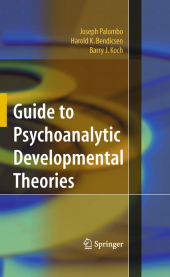 Neuerscheinungen 2010Stand: 2020-01-07 |
Schnellsuche
ISBN/Stichwort/Autor
|
Herderstraße 10
10625 Berlin
Tel.: 030 315 714 16
Fax 030 315 714 14
info@buchspektrum.de |

Harold K. Bendicsen, Barry J. Koch, Joseph Palombo
(Beteiligte)
Guide to Psychoanalytic Developmental Theories
2009. 2010. xlviii, 416 S. 235 mm
Verlag/Jahr: SPRINGER, BERLIN; SPRINGER NEW YORK; SPRINGER 2010
ISBN: 1-441-92779-4 (1441927794)
Neue ISBN: 978-1-441-92779-8 (9781441927798)
Preis und Lieferzeit: Bitte klicken
The profound influence of psychoanalytic theories of development still resonates in the thinking and practice of today´s mental health professionals. This guide provides a succinct and reliable overview of what these theories are and where they came from.
As the foundational theory of modern psychological practice, psychoanalysis and its attendant assumptions predominated well through most of the twentieth century. The influence of psychoanalytic theories of development was profound and still resonates in the thinking and practice of today´s mental health professionals. Guide to Psychoanalytic Developmental Theories provides a succinct and reliable overview of what these theories are and where they came from. Ably combining theory, history, and biography it summarizes the theories of Freud and his successors against the broader evolution of analytic developmental theory itself, giving readers a deeper understanding of this history, and of their own theoretical stance and choices of interventions. Along the way, the authors discuss criteria for evaluating developmental theories, trace persistent methodological concerns, and shed intriguing light on what was considered normative child and adolescent behavior in earlier eras.
Each major paradigm is represented by its most prominent figures such as Freud´s drive theory, Erikson´s life cycle theory, Bowlby´s attachment theory, and Fonagy´s neuropsychological attachment theory. For each, the Guide provides:
biographical information
a conceptual framework
contributions to theory
a clinical illustration or salient excerpt from their work.
The Guide to Psychoanalytic Developmental Theories offers a foundational perspective for the graduate student in clinical or school psychology, counseling, or social work. Seasoned psychiatrists, analysts, and other clinical practitioners also may find it valuable to revisit these formative moments in the history of the field.
Introduction.-I. Drive Theory.-Sigmund Freud.-II. Ego Psychological Theories.-Heinz Hartmann.-Anna Freud.-Rene Spitz.-Peter Blos.-Stanley I. Greenspan.-III.-Object Relations Theories.-Melanie Klein.-Donald Winnicott.-Margaret Mahler.-Otto Kernberg.-V. Life Cycle Theory.-Erik Erikson.-IV. Interpersonal Theory.-Harry Stack Sullivan.-VI. Theories of the Self.-Daniel Stern.-Heinz Kohut.-VII. Attachment Theories. Part 1: Traditional Attachment Theories.-John Bowlby.-Mary Ainsworth & Mary Main.-Part 2: Neuropsychological Attachment theories: The return to psychoanalysis.-Allan Schore.-Peter Fonagy.-Conclusion.-Appendix A. Stages or Phases of Development.-Appendix B. Comparative Chart of Psychoanalytic Developmental Theories.-Appendix C. Who Analyzed Who.-Index


